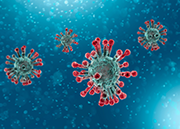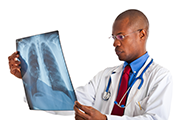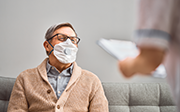Accountable Care Organizations (ACOs) Leverage High-Tech, High-Touch Population Health Tools to Support Patients at High Risk for COVID-19
ACOs and COVID-19
Faced with the greatest public health threat in a century, ACOs across America are identifying patients at high risk for COVID-19, educating them about minimizing exposure, making sure they have enough food and medication to stay home, and remotely monitoring their underlying conditions.
As of January 2020, about 550 Medicare Shared Savings Program (MSSP) and Next Generation ACOs cared for more than 12.3 million beneficiaries. The MSSP is a voluntary program that maintains beneficiary choice of providers while encouraging local physicians, hospitals and others to work together and take responsibility for improving quality, enhancing patient experience, and reducing waste to keep care affordable. Hundreds more commercial and Medicaid ACOs serve millions of additional patients.
In response to the COVID-19 pandemic, ACOs are using high-tech, high-touch population health strategies that leverage in-depth information with trusted relationships to support high-risk patients.
The ACO Difference
Too often, health care delivery is fragmented and siloed. Health plans and other payers, for example, might have information about emergency department visits and hospitalizations but lack trusted relationships with patients, limiting opportunities to improve care. On the flip side, providers often have strong patient relationships but lack information about care in other settings, missing opportunities to improve outcomes. The ACO model helps bridge this gap by getting providers data they can use to leverage strong patient relationships and improve care.
Identifying and Reaching Out to High-Risk Patients
At the epicenter of the nation’s worst COVID-19 outbreak, New York-based Mount Sinai At the epicenter of the nation’s worst COVID-19 outbreak, New York-based Mount Sinai Health System’s

ACO lost no time in developing a tool to identify and reach out to high-risk patients—both for COVID-19 and with chronic conditions, such as COPD, heart failure and diabetes, that can spiral out of control if left unmanaged. “High risk can be subjective, and these patients are not just high risk for COVID but high risk generally, so the tool will be helpful in the future as well,” said Robert Fields, M.D., Mount Sinai senior vice president and chief medical officer for population health. Trained staff call each patient, checking for food insecurity; verifying they have needed medications; screening for COVID-19 symptoms, underlying physical conditions, and mental health and wellbeing; and making sure patients know how to reach their provider, either in person or via telehealth.
ACOs connect population health and public health strategies to solve COVID-19 challenges.
Similarly, Advocate Aurora Health (AAH), which operates three ACOs across Illinois and Wisconsin, quickly established a surveillance system and COVID-19 patient
registry linked to patients’ electronic health records. Care management teams then monitor patients and provide virtual visits, as well as patient education and information on social resources. “Advocate Aurora Health rapidly came together to prepare our hospitals and physician groups for the fight against COVID-19, utilizing innovative technology solutions,” said Megan Reyna, AAH vice president of government and value-based programs. New Jersey-based Summit Medical Group, which participates in both Medicare and commercial ACOs, established a nurse hotline to respond to patients with concerns about COVID-19, triaging patients to affiliated urgent care centers for moderate to severe symptoms or arranging telemedicine visits for patients with mild symptoms. In North Carolina, where Coastal Carolina Quality Care ACO has seen less than a dozen COVID-19 cases and few hospitalizations to date, care managers also are reaching out to patients, especially those with mental health conditions, to answer questions, check on medications, make sure patients have food, or arrange to get groceries delivered. The ACO also informed the local hospital that it can monitor patients in their homes, multiple times a day, so that patients can leave the hospital more quickly and bypass nursing homes where they may be a risk to other patients or at higher risk themselves for coronavirus.
Telehealth and Remote Monitoring
Already leaders in deploying telehealth, many ACOs are accelerating the move to virtual visits in the face of the COVID-19 pandemic. For example, Adelade, which partners with independent provided its national network of physician-led ACOs with a comprehensive telehealth solution in a matter of days in late March, allowing primary care practices to maintain access for elderly and high-risk patients while staying safe in their homes and minimizing the spread of the virus. Similarly, New Jersey-based Atlantic Health System’s ACO is

In South Jersey, AllCare Health Alliance, a Medicare MSSP ACO affiliated with Cooper University Health Care, is conducting annual wellness visits via telehealth to identify screenings and “tee up” other care needed once stay-at-home restrictions are lifted, according to CEO Daniel Hyman, D.O. “This approach will keep the health and wellbeing of the most vulnerable in the forefront,” he said. Given the isolation and stress that many people face, especially older patients, Summit Medical Group, also in New Jersey, has expanded telemedicine access “to help our patients with chronic behavioral health issues or acute anxiety or depression due to the current crisis,” said Ashish Parikh, M.D.
In South Jersey, AllCare Health Alliance, a Medicare MSSP ACO affiliated with Cooper University Health Care, is conducting annual wellness visits via telehealth to identify screenings and “tee up” other care needed once stay-at-home restrictions are lifted, according to CEO Daniel Hyman, D.O. “This approach will keep the health and wellbeing of the most vulnerable in the forefront,” he said. Given the isolation and stress that many people face, especially older patients, Summit Medical Group, also in New Jersey, has expanded telemedicine access “to help our patients with chronic behavioral health issues or acute anxiety or depression due to the current crisis,” said Ashish Parikh, M.D.
Care Transitions
At Michigan-based Trinity Health, one of the nation’s largest Catholic health systems, serving more than 30 million people across 22 states, the system’s ACOs and other population health initiatives are focused on transitions of care to ensure “handovers” are in place for all patients discharged from
ACOs are focused on transitions of care to ensure ‘handovers’ are in place for all patients discharged from inpatient, skilled nursing facility and other settings to get patients home as quickly as possible to avoid exposure to the coronavirus.

inpatient, skilled nursing facility and other settings. The goal is to get patients home as quickly as possible to avoid exposure to the coronavirus.
Concurrently, Trinity Health has expanded home health care services to make sure patient needs for wound care,
oxygen, and other resources are met. The temperatures of home health workers are taken before entering patient homes to allay concerns about spreading the virus. Care transitions are also a focus at Summit Medical Group, where all patients discharged from the hospital are contacted by a care manager and scheduled for a telemedicine visit within 48 hours, with clinicians and patients jointly mapping out a follow-up plan based on illness severity.
Advocate Aurora Health launched two new programs in five weeks—Home Hospital and Recovery at Home. Patients in both programs receive in-person and virtual home visits from advanced practice clinicians and nurses. Home hospital patients receive oxygen and devices to allow for remote patient monitoring and live video visits, while Recovery at Home patients receive a pulse oximeter for reporting vitals. “This is an excellent way to assure continuity of care, ease patient anxiety, and safeguard patients and staff during these challenging times,” Reyna said. “Overall, these programs provide the same quality and level of service provided by brick and mortar services within patients’ homes—where they are most comfortable—and during the COVID-19 outbreak, most safe.
Focus on Nursing Homes

About a fifth of all U.S. coronavirus deaths have been linked to nursing facilities, making them a priority for ACOs caring for Medicare beneficiaries. In Southern New Jersey, AllCare Health Alliance is testing 2,200 patients and staff across 17 facilities to isolate patients with the virus and decrease exposure to staff members who test positive. Since hospitals and nursing homes are such high-risk sites for virus transmission, Atlantic Health System has converted an empty assisted living facility to serve as a temporary skilled-nursing site to transition patients out of the hospital sooner with continued isolation until transmission-based precautions are no longer needed. The system is also stressing the need for post-acute facilities to treat in place, but staffing, personal protective equipment and testing shortages limit the facilities ability to treat patients with COVID on site.
ACOs at a Glance
Aledade, based in Bethesda, Md., partners with primary care physicians to build and lead ACOs across 25 states and in partnership with more than 650,000 patients in more than 300 practices.
Advocate Aurora Health operates three MSSP ACOs in Illinois and Wisconsin caring for almost 200,000 Medicare beneficiaries.
AllCare Health Alliance, based in Camden, N.J., is affiliated with Cooper University Health Care, a major academic health system with more than 1,250 nurses and 630 physicians in more than 70 specialties.
Atlantic ACO, based in New Jersey, is a health system and physician partnership with close to 2,000 physicians and more than 270,000 attributed covered lives across Medicare and commercial contracts.
Coastal Carolina Quality Care ACO, based in Bern, N.C., includes 40-plus physicians and about 20 mid-level practitioners caring for 12,000 Medicare patients spread over five counties in eastern North Carolina.
New York Medical Partners ACO is affiliated with New York City-based Mount Sinai Health System, which has more than 400 locations across New York and employs 7,400 primary care physicians and specialists.
Summit Medical Group, based in Berkeley Heights, N.J., is the state’s oldest and largest multispecialty medical group and a member of the Trinity Health ACO.
Trinity Health, based in Livonia, Mich., serves diverse communities that include more than 30 million people across 22 states and participates in the Medicare Next Generation ACO Model, caring for more than 80,000 Medicare beneficiaries across 11 states.
